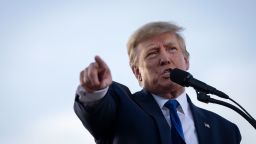Editor’s Note: Julian Zelizer, a CNN political analyst, is a professor of history and public affairs at Princeton University and author of the forthcoming book “The Presidency of Donald J. Trump: A First Historical Assessment.” Follow him on Twitter @julianzelizer. The views expressed in this commentary are his own. View more opinion on CNN.
The House select committee investigating January 6 announced that it will hold eight hearings in June – but will they manage to change public opinion, spur a criminal referral and pressure the Department of Justice to pursue its own investigation?
These hearings, which committee chairman Bennie Thompson promised to be a “mixture of some prime time and some regular,” are sure to produce some shocking information. Rep. Jamie Raskin gave a preview on Twitter, saying, “We now have evidence to support the story of the worst presidential political offense against the Union in American history” and pledging the hearings would “expose every facet of the assault against our democracy and Constitution on 1/6.”
In the nearly 16 months since the January 6, 2021, attack on the US Capitol, a series of revelations have emerged from news reports as well as from the committee’s investigation. A forthcoming book by New York Times reporters Alex Burns and Jonathan Martin has also opened a disturbing window into just how deep the planning was for the campaign to overturn the 2020 election. And a series of text messages, submitted to the committee by Mark Meadows, former President Donald Trump’s chief of staff, shows the frustration and shock even the most ardent Republicans felt with Trump’s effort to push the “big lie.” In the days after January 6, Fox New host Sean Hannity said he did not want Trump to speak about the 2020 election ever again, while House Minority Leader Kevin McCarthy considered advising Trump to resign.
But do congressional hearings even matter anymore? Is it possible for major hearings to have the kind of impact that we saw in the summer of 1973, when the select committee investigating Watergate helped shift public opinion and nudge political leaders to support impeaching President Richard Nixon?
It’s fair to say: probably not. If we have learned anything from the Trump presidency, it’s that the forces of political polarization have ossified, making it difficult to move public opinion, even in the face of shocking scandals.
Let’s not forget, Trump was impeached twice. Both times, the Senate failed to convict him, even though there was evidence he abused his power to try to obtain dirt on a political opponent’s family, and later pushed a conspiracy theory that fueled the violence on January 6, 2021.
Over time, Republicans fell in line and downplayed Trump’s actions. Those like Rep. Liz Cheney of Wyoming who dared to take a stand were ostracized. Polls have also shown that an overwhelming majority of self-identified Republicans believe there was “widespread fraud in the 2020 election.” And beyond the GOP, many Democrats and independents seem to have moved on to other issues. As a result, January 6 is being treated like yet another story in our overcrowded news cycle rather than the fundamental constitutional crisis it is.
The Watergate hearings, chaired by North Carolina Senator Sam Ervin, seemed to offer a different model. The hearings, which included 51 days of televised coverage, produced damaging information that played an important role in burying Nixon’s presidency. Most important was the discovery that Nixon had taped White House conversations, recordings which would eventually reveal – after protracted legal proceedings – that he had attempted to obstruct justice. The hearings also helped the public see the levels of corruption and abuse of power that had come to define the Oval Office under Nixon’s tenure.
To be sure, there is a certain level of nostalgia now surrounding those hearings. There were many other factors that ultimately led to Nixon’s resignation in August 1974, ranging from the dogged journalists who kept following the money trail to Judge John Sirica, whose case against the Watergate burglars opened the doors to the broader corrupt campaign.
It’s also important to note that many lawmakers didn’t break with the President for months. And according to a Gallup poll conducted in February 1974, only 38% of the electorate favored impeachment. It wasn’t until after the Supreme Court ruled that the administration had to release the White House tapes in July 1974 that the tides turned and there were enough votes to not only impeach Nixon but remove him from office. The famous cabal of Republican senators including Barry Goldwater, Hugh Scott and John Rhodes finally met with the President in August and told him that he had little support, even among his own party.
It’s difficult to imagine that the January 6 hearings will produce a similarly dramatic groundswell of opposition against Trump. Given that the campaign against the 2020 election was conducted in broad daylight, we already know that Trump repeated lies about election fraud, launched a flimsy legal campaign and told people that “if you don’t fight like hell you’re not going to have a country anymore.” None of this was enough to shake his partisan support.
Even if the committee somehow produced a tape of Trump explicitly planning an insurrection, it’s hard to imagine that it would make much difference.
But moving public opinion is not the House select committee’s main responsibility. The purpose of the hearings is to produce an official account of what happened and compel members of Congress to go on the record about where they stand in light of that information. The intent behind the Watergate hearings was not to force Nixon’s resignation, but to offer a thorough record of the way that he had abused his authority as President. The rest was up to others to decide.
That is the main goal for the January 6 committee in 2022. Whether or not they are able to shock the nation is a different question. They need to focus on the vital congressional role of oversight. If nothing changes, but we have a much more through understanding of how the anti-democratic efforts of 2020 and 2021 unfolded, our nation will still be better off for it. Accountability starts with accurate information. This element of accountability is what congressional committees have been able to do at their best.



